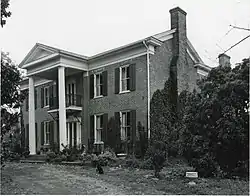Mimosa Hall (Leigh, Texas)
Mimosa Hall is the name of a plantation house in Leigh, Texas. Mimosa Hall was built in 1844 by John J. Webster, an architect from Alabama who moved to the then Republic of Texas. John J. Webster was born in Alabama in 1796, the son of a revolutionary soldier.[2] He moved to Texas in 1839 with his wife, Miriam Webster, and their children.[2]
Mimosa Hall | |
 Mimosa Hall in 2017 | |
 Mimosa Hall  Mimosa Hall | |
| Location | 9403 FM 134, Leigh, Texas |
|---|---|
| Coordinates | 32°35′19″N 94°8′37″W |
| Area | 6 acres (2.4 ha) |
| Built | 1844 |
| Architect | John Johnston Webster |
| Architectural style | Greek Revival |
| NRHP reference No. | 78002949[1] |
| Added to NRHP | November 2, 1978 |
History
It was the first brick house in Harrison County, originally situated in the middle of 7,000 acres (28 km2) of land.[3] All of the bricks were made on the plantation, and the lumber was cut on the property by the slaves.[2] The plantation was primarily used for planting.
The family cemetery was on the property adjoining the house.[4] Nestled two miles (3 km) back in the woods, the cemetery is surrounded by an old brick wall on the top of a knoll. The original family were all buried there, and the cemetery is still maintained by their descendants.[2]
The American Museum in Britain has in its permanent collection a quilt made by slaves on the Mimosa Hall Plantation. The quilt, c. 1860, is called "The Chalice." [5]
Current
Today the house sits in the middle of 150 acres (0.61 km2), and is a private residence. It is registered in the National Register of Historic Places, along with its sister home in nearby Karnack, Texas, which was the birthplace of Lady Bird Johnson. The plantation stayed in the original family until the 1980s, when it was sold by Douglas Blocker. Mimosa Hall was then a bed and breakfast for several years, until it was sold to the current owners. Today the plantation is a private residence.
References
External links
| Wikimedia Commons has media related to Mimosa Hall. |
- Mimosa Hall from the Center for Regional Heritage Research, Stephen F. Austin State University




